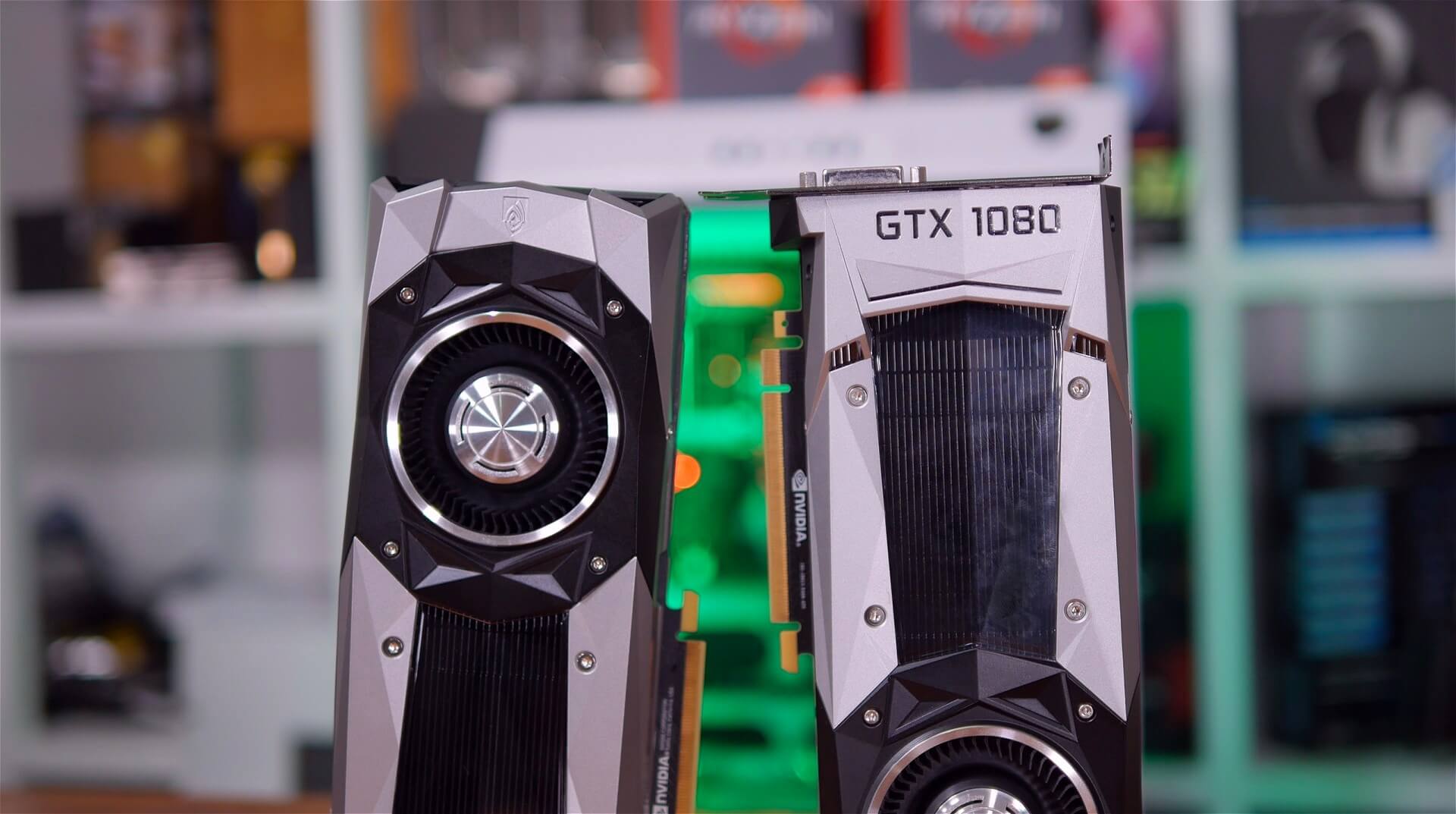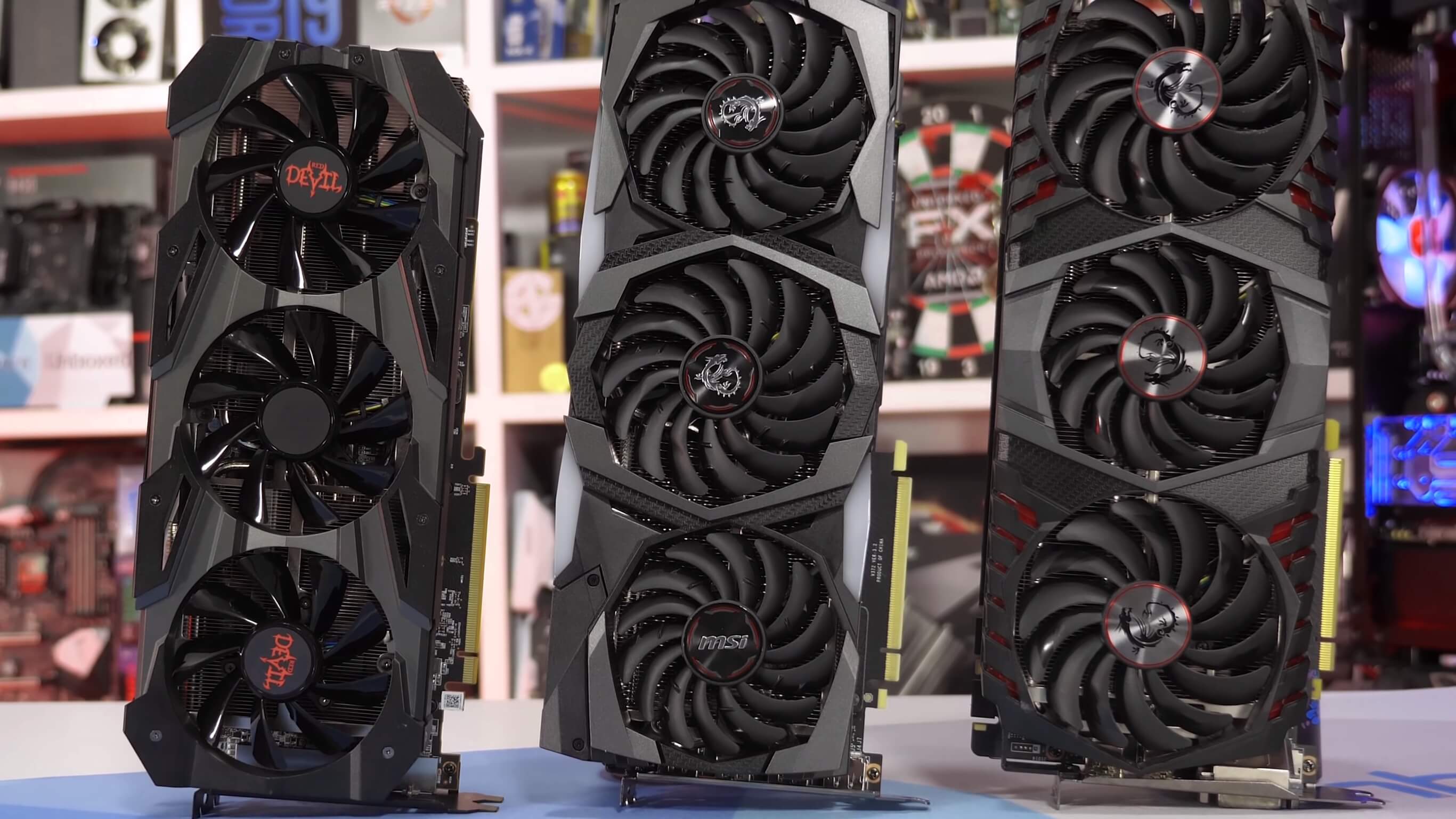This is a straightforward comparison pitting the previous generation GeForce flagship, the GTX 1080 Ti head to head against the RTX 2070 Super and RX 5700 XT in 39 games. We'll learn how the GTX 1080 Ti stacks up versus these new "mid-range" GPUs and if you should buy one, something that will be answered before this article is over.
For testing, representing the red team we have the PowerColor RX 5700 XT Red Devil and for the green team the MSI RTX 2070 Super X Trio and MSI GTX 1080 Ti Gaming X Trio. Our standard GPU test rig was used, comprising a Core i9-9900K clocked at 5GHz with 16GB of DDR4-3400 memory. We tested all games at 1440p and 4K resolutions, for a total of 39 titles.
As usual we'll go through a few of these game benchmarks where we see noteworthy data to highlight and towards the end of the feature we'll have a few big breakdown graphs comparing all the performance data.
First up we have the newly released Gears 5. The GTX 1080 Ti dominated the 2070 Super and 5700 XT, both newer GPUs averaged 76 fps at 1440p while the Pascal GPU pushed on to average 88 fps. The 1080 Ti was also 14% faster than the 2070 Super at 4K and 25% faster than the 5700 XT.
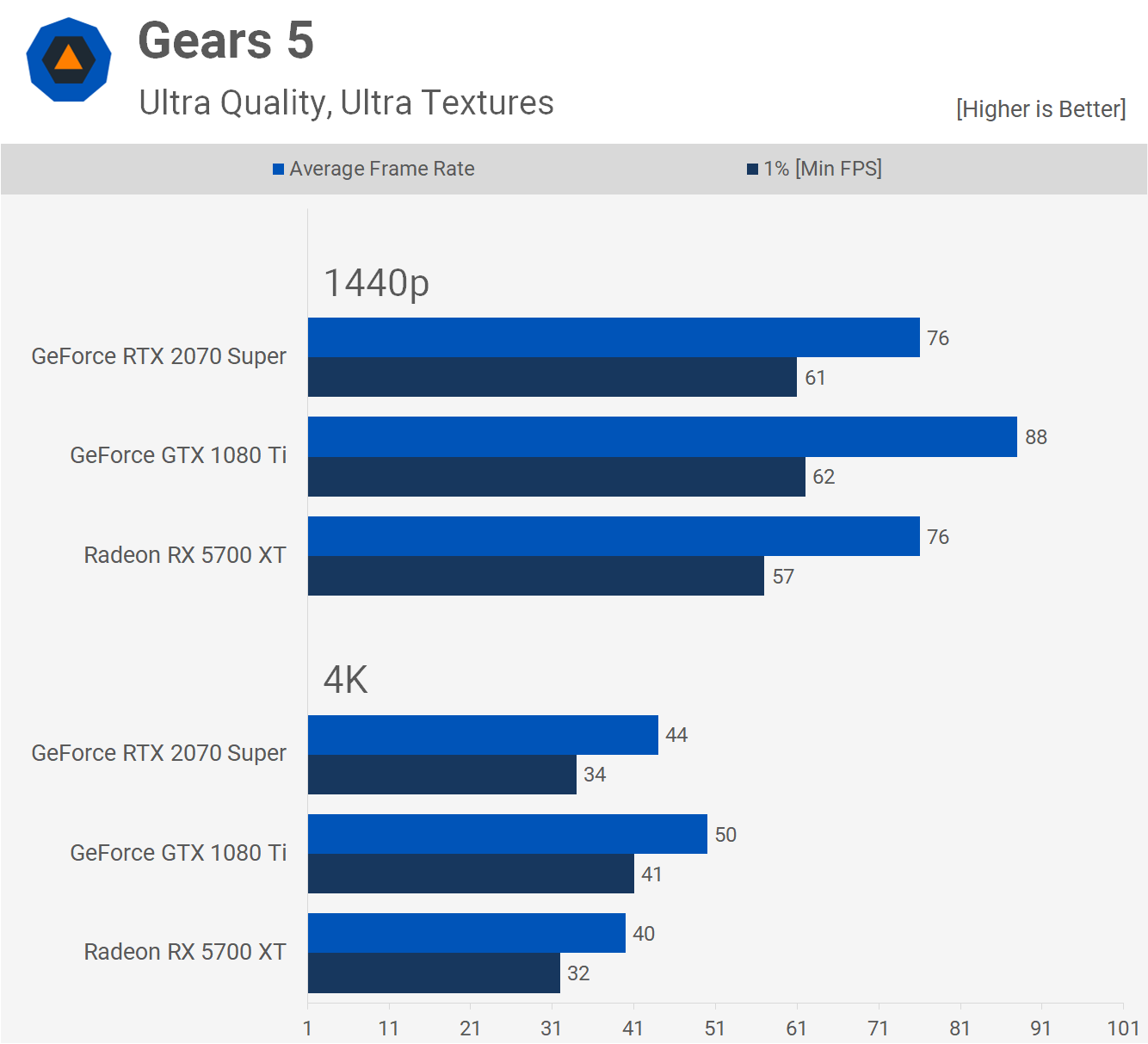
Control is another new addition to our battery of benchmarks, but this one seems to be very unoptimized. All three GPUs failed to average more than 60 fps at 1440p, so that's pretty horrible. The game looks good, not amazing though, and certainly not good enough to justify this level of performance. So for now at least, Control looks to be a real fps pig.

Next up we have War Thunder and here the 1080 Ti edged out the 2070 Super by a 13% margin at 1440p, though both delivered similar 1% low performance. The 1080 Ti also blew away the 5700 XT by a 34% margin and we see a similar thing at 4K, despite similar 1% low performance.

World of Tanks plays very well on the GTX 1080 Ti, here the Pascal GPU was 15% faster than the 2070 Super and 24% faster than the 5700 XT. That's a solid result for the older 1080 Ti, though frame rates were high with all GPUs at 1440p using maxed out settings. The 4K result was more impressive, 94 fps on average from the 1080 Ti enabled an extremely smooth gaming experience.
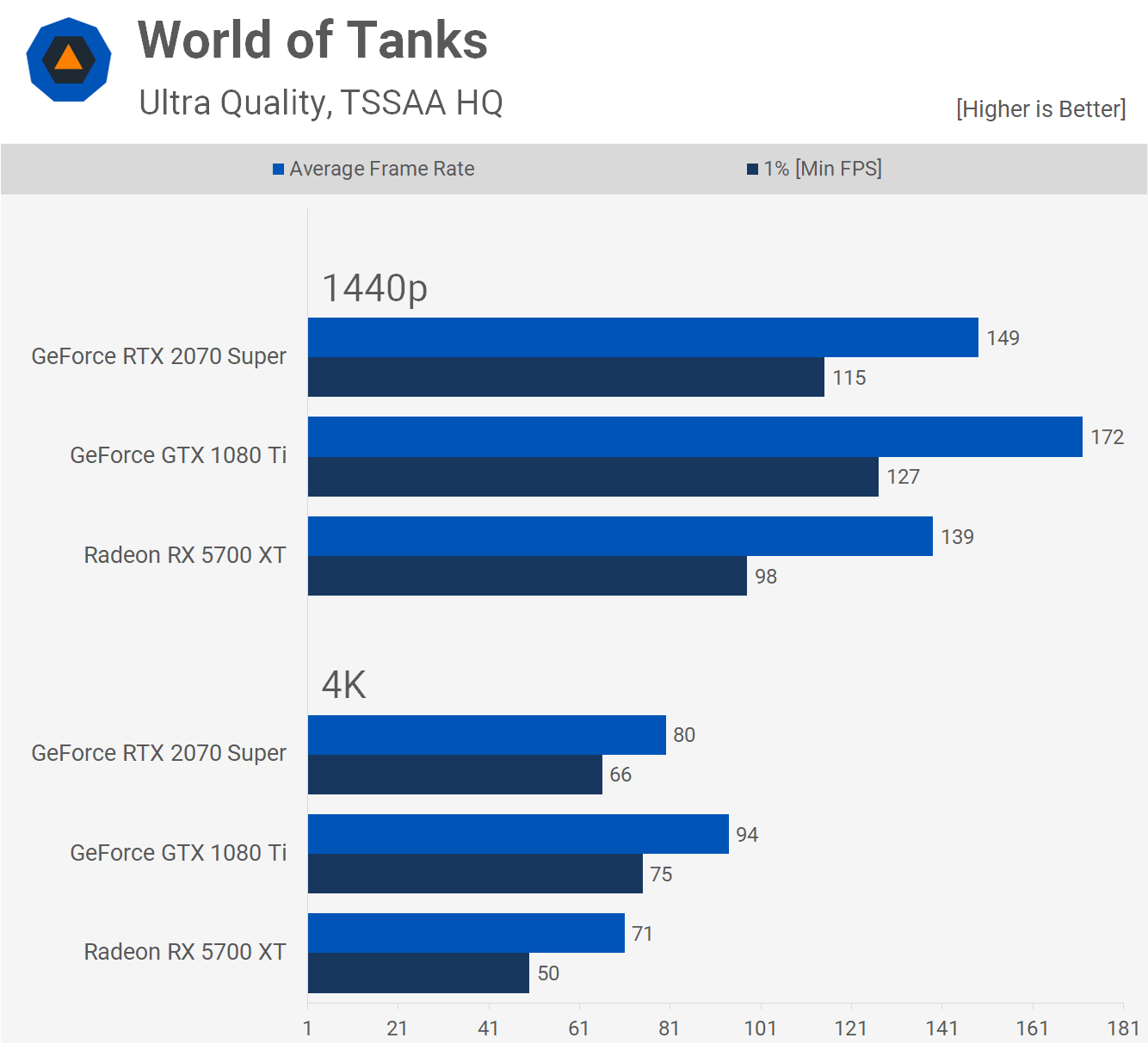
The GeForce GPUs are a little stronger in The Division 2, the 1080 Ti for example was 13% faster than the 5700 XT at 1440p and 15% faster at 4K. The 1080 Ti also edged out the 2070 Super at 1440p, but matched it at the 4K resolution.
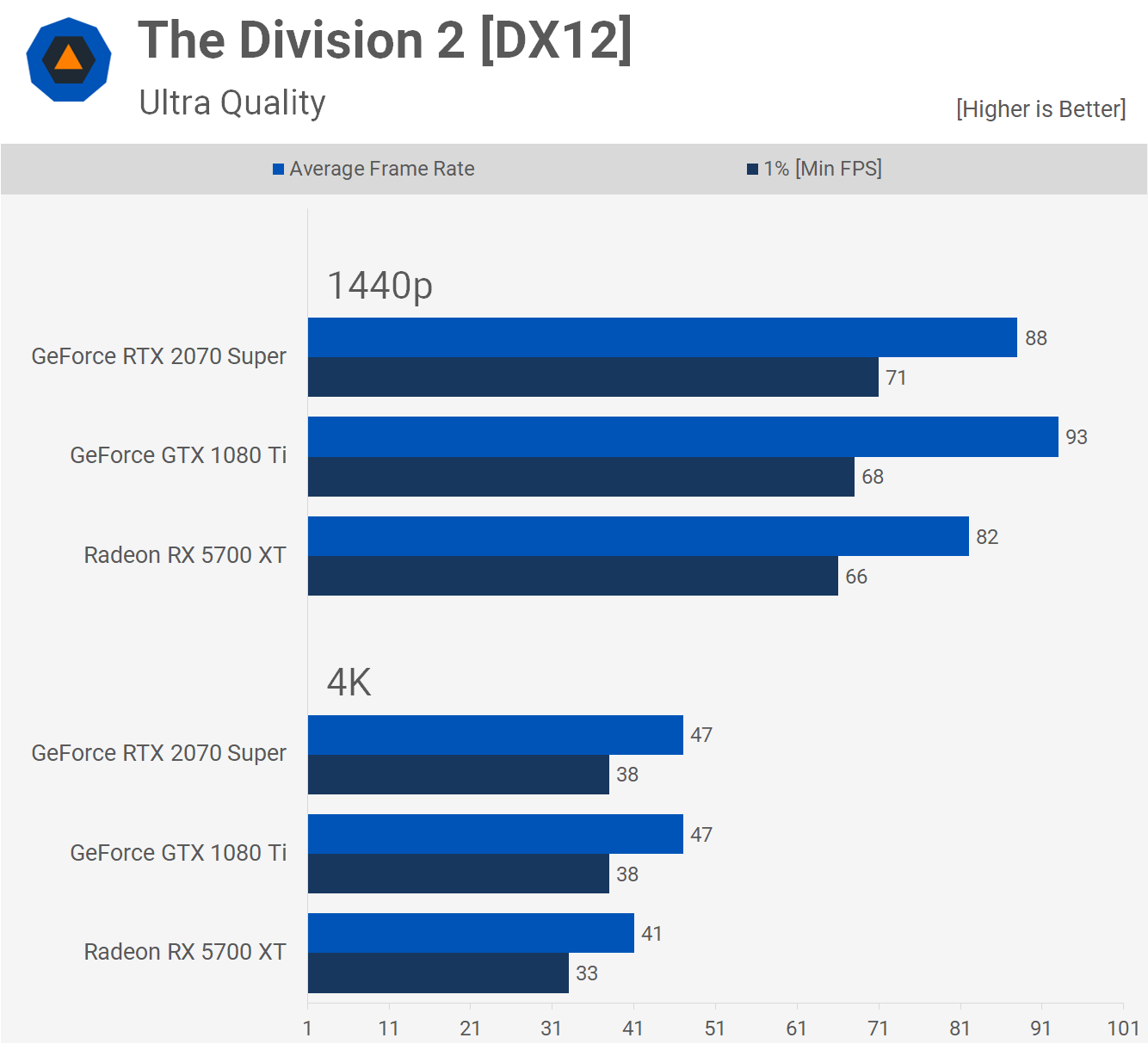
Interestingly, both the 5700 XT and 2070 Super comfortably beat the 1080 Ti in Counter-Strike Global Offensive, but given the frame rates it's hard to say how much it even matters. I also doubt many play at 4K but if you do, you can still expect over 200 fps with any one of these GPUs.

Recently the RTX series saw a 20-30% performance boost in Forza Horizon 4 with the latest drivers. However, there has been no performance uplift for the Pascal GPUs and as a result the 1080 Ti still trails the 5700 XT, at least at 1440p. The results are more competitive at 4K and here the 1080 Ti matched the 5700 XT and wasn't a great deal slower than the 2070 Super.
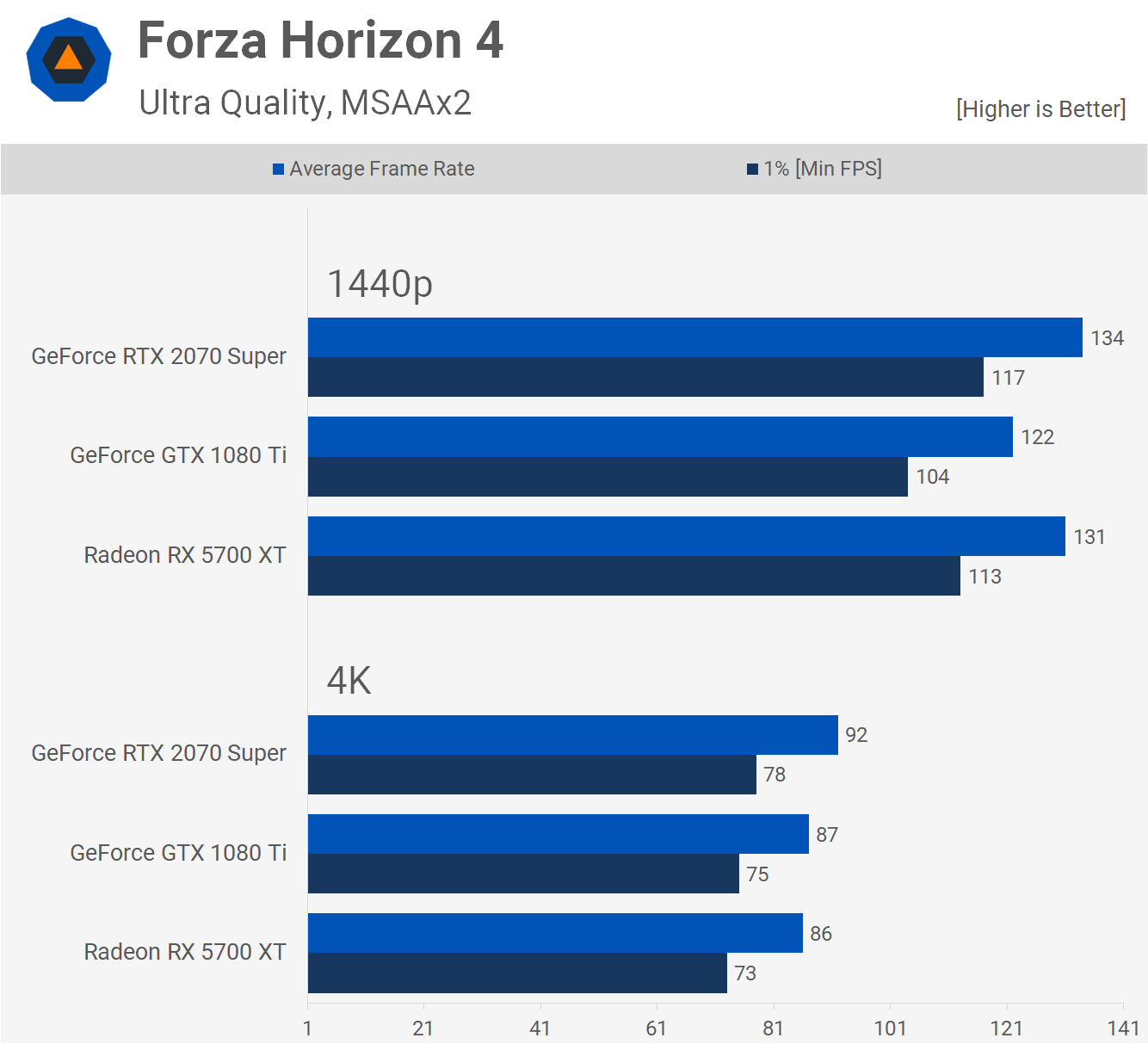
Something we've noticed is how the older Pascal GPUs perform well in older titles, or at least titles with dated game engines. In Fortnite we see the 1080 Ti outclassing both the 2070 Super and 5700 XT at both 1440p and 4K. At the 4K resolution it was 14% faster than the 2070 Super, so a pretty handy win here.

Like Fortnite, PUBG uses the Unreal Engine 4 and so we see the 1080 Ti easily beating the 5700 XT, though this time it wasn't much faster than the 2070 Super.

Performance in F1 2019 was virtually identical across these three GPUs with average frame rates ranging from 112 - 114 fps. The results at 4K were also very competitive, the GTX 1080 Ti matched the 5700 XT exactly.

Wolfenstein: Youngblood is a relatively new addition to our benchmark lineup and this one plays very well on the newer Turing GPUs. The 1080 Ti was 10% slower than the 2070 Super and when talking over 140 fps on average, that's not a big deal. The 1080 Ti was comparable to the 5700 XT at both 1440p and 4K.
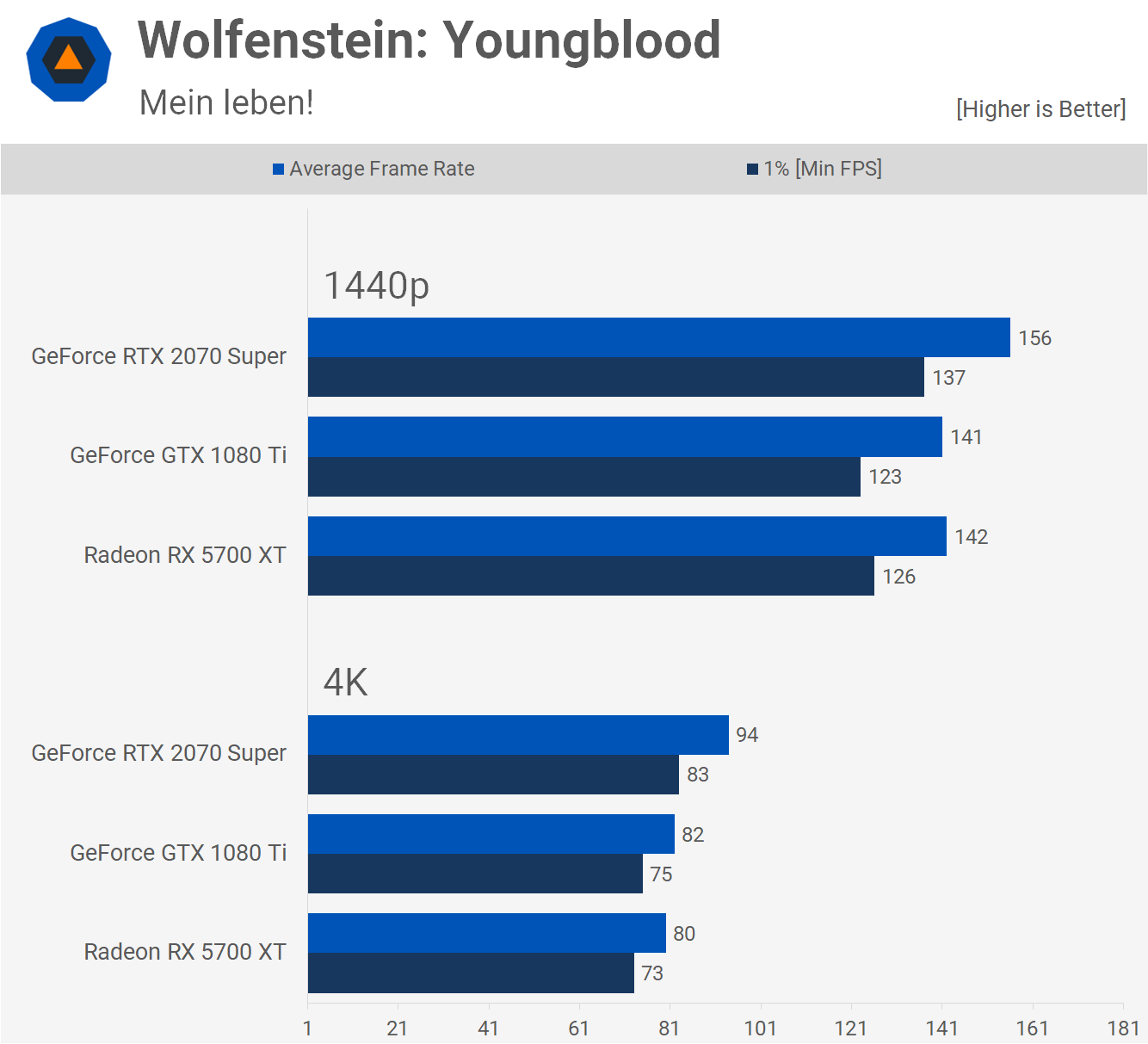
All three GPUs performed very well in Apex Legends, particularly at 1440p. The GTX 1080 Ti did beat the 5700 XT by a small margin while it wasn't much slower than the newer RTX 2070 Super. Then at 4K the GeForce GPUs delivered basically identical performance while the 5700 XT fell away by around a 12% margin.
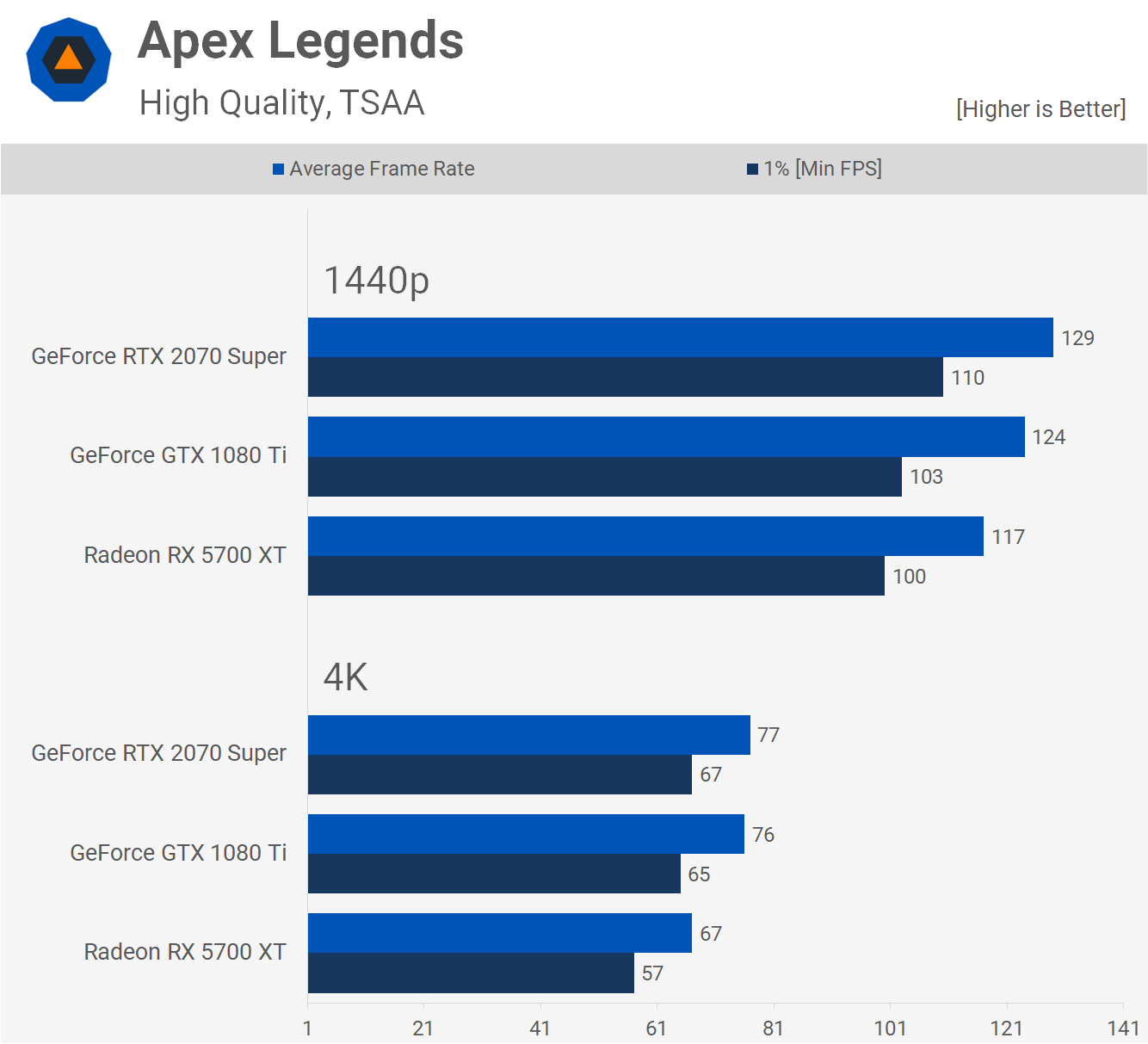
For testing Rainbow Six Siege we're manually forcing a 100% render scale with TAA enabled. Here we see all GPUs able to average over 100 fps at 1440p, the 1080 Ti and 5700 XT delivered a similar 1% low result, but the Pascal GPU was a little faster on average. When compared to the 2070 Super the 1080 Ti was 8% slower and we see a similar thing at the 4K resolution as well.

The last game we're going to look at before jumping into the 39 game breakdown is Monster Hunter World.
Here we see very competitive performance at both tested resolutions, the 1080 Ti was a smidgen faster than the 2070 Super and 5700 XT, but overall the gaming experience was much the same.
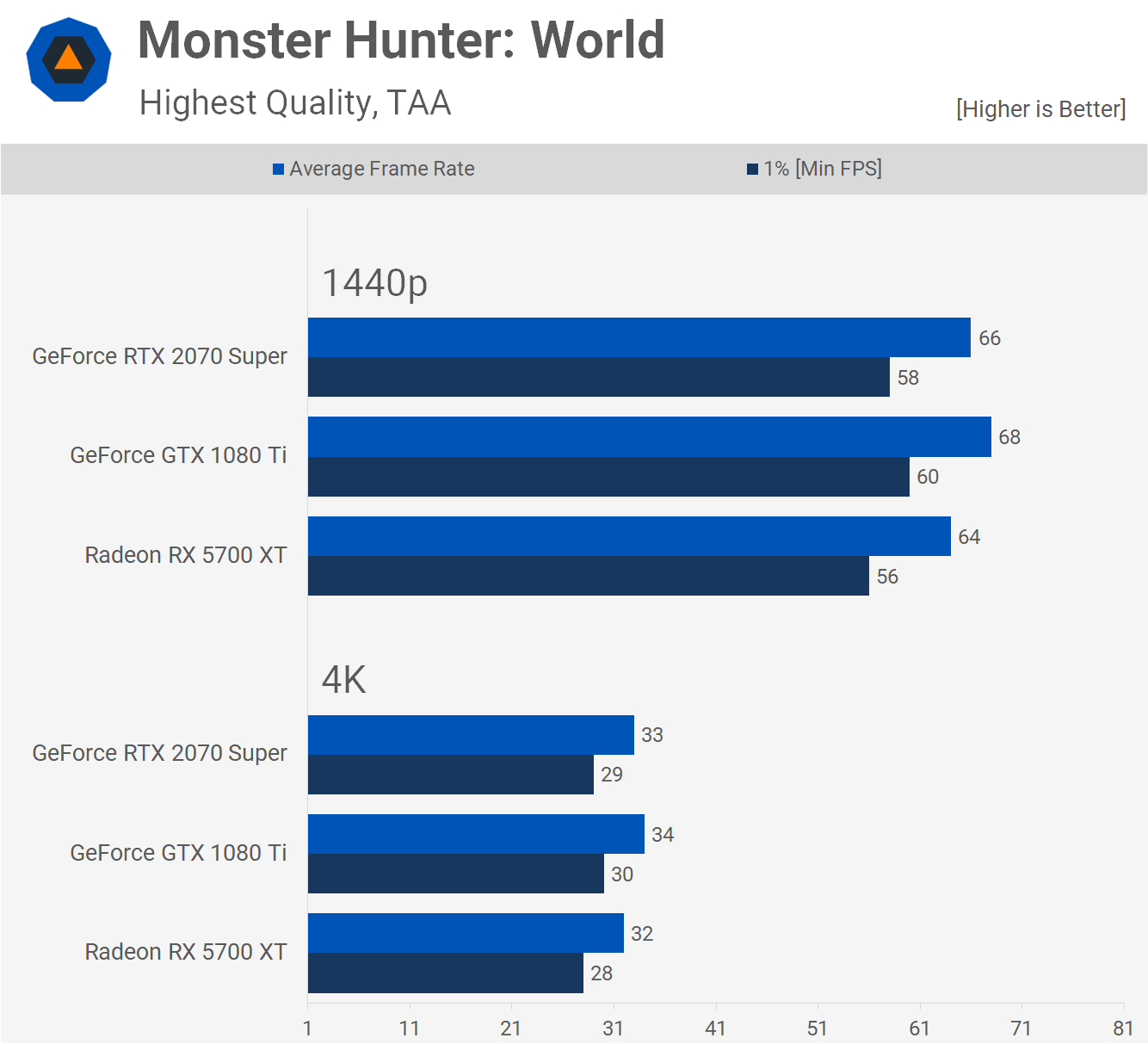
Power Consumption
A brief note about power consumption. We don't include these on every game benchmark comparison since consumption figures don't change from the initial testing and we refuse to include thermal data as that can vary significantly from one model to the next. E.g. not all RTX 2070 Super graphics cards run at the same temperature, so each individual model will present some variance. The same is true for power consumption. Some models are more power hungry than others, but the discrepancy here is smaller.
Anyway, when it comes to power consumption, the GTX 1080 Ti GPU consumes around 27% more power than the 2070 Super GPU and around 35% more than the 5700 XT GPU...
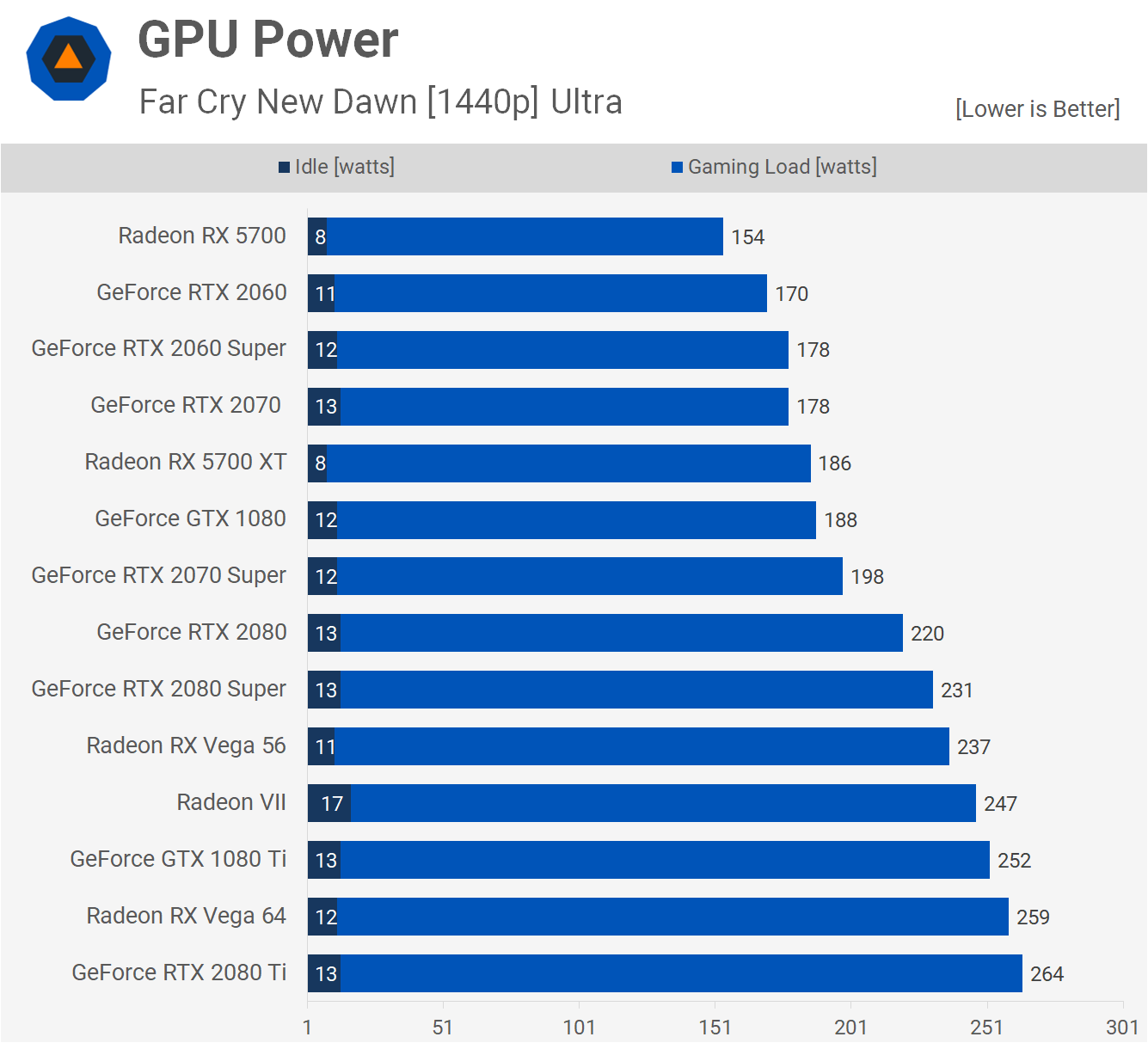
When comparing the entire system consumption the 1080 Ti consumed 15% more power than the 2070 Super and 12% more power than the 5700 XT. So while the newer GPUs are more efficient, it's not exactly going to have a noticeable impact on your system.
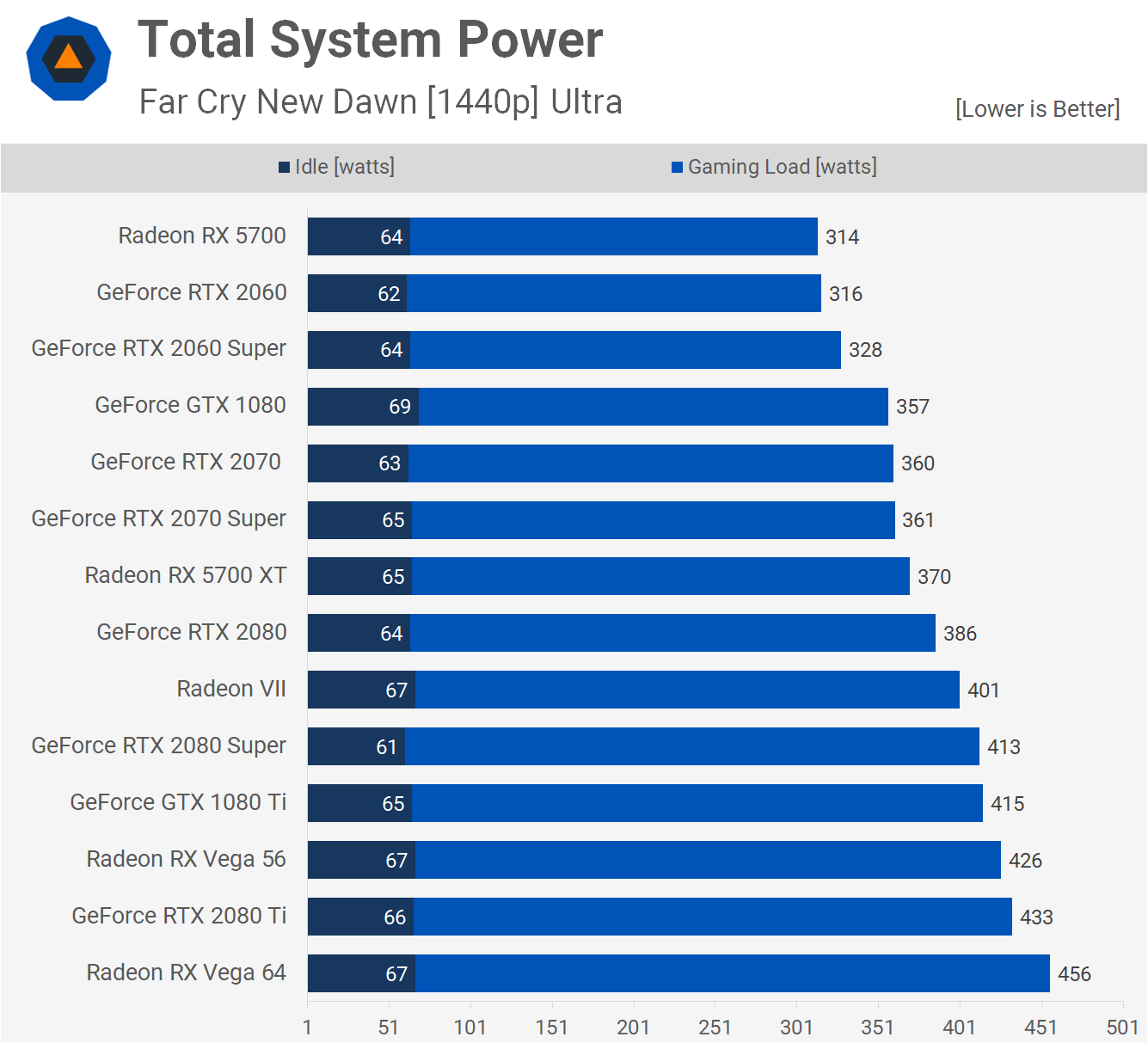
Performance Summary
As expected the two year old flagship Pascal GPU still packs quite the punch and has no trouble keeping up with the current performance mid-range options from AMD and Nvidia. We've only looked at results for about a dozen titles, so let's see how they compare across all 39 games tested.
GTX 1080 Ti vs. RTX 2070 Super
As you can see on the graph below, the older GTX Pascal was 3% faster on average at 1440p. Overall that means very similar performance on average, though we see big differences when looking at individual titles in some instances. The 1080 Ti, for example, was 16% faster in Gears 5, 15% faster in World of Tanks and 13% faster in Quake Champions and War Thunder. It was also up to 10% slower in CSGO and Wolfenstein Youngblood, 9% slower in Forza Horizon 4 and 8% slower in Rainbow Six Siege.
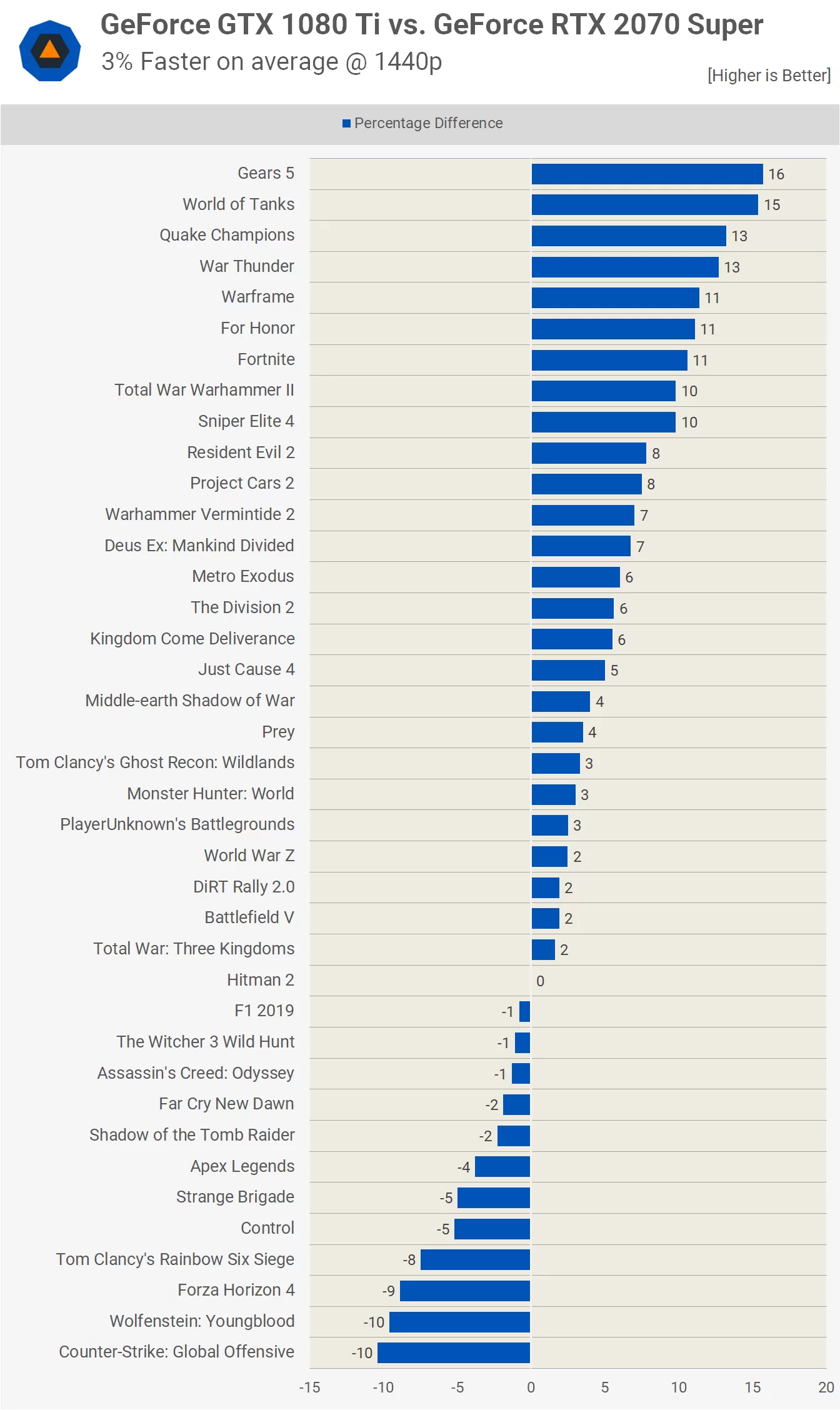
Of the 39 games tested the margin was seen to be 10% or less in 32 of them. Then we saw a 5% margin or less in 19 of the games tested. So as the 3% difference on average suggests, for the most part performance was similar.
GTX 1080 Ti vs. Radeon 5700 XT
When compared to the RX 5700 XT, the 1080 Ti was 9% faster on average at 1440p and as this figure suggests, the GeForce GPU came out on top in significantly more titles. The outliers include a 34% victory in War Thunder and 32% in Vermintide 2, while it was also quite a bit faster in World of Tanks and Metro Exodus.
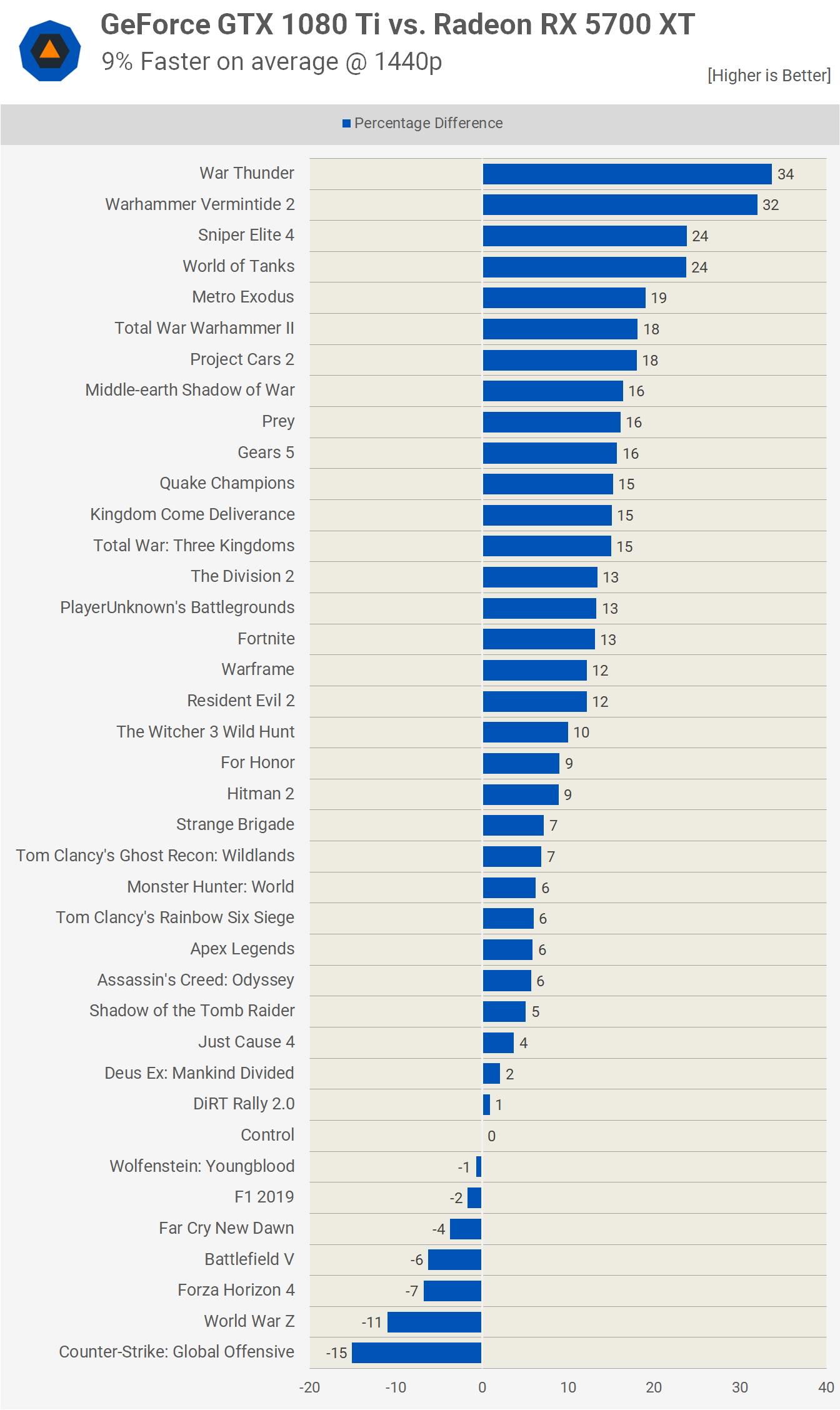
Closing Remarks
The GeForce GTX 1080 Ti remains a very capable graphics card in late 2019, no surprises there.
Many of you wanted this test to address mainly two questions: First, has Nvidia started to abandon Pascal with driver optimization, in other words, has the 1080 Ti began to slip behind Turing based GPUs such as the 2070 Super? And second, should you buy a 1080 Ti today, and what price range should you be aiming for?
Let's take the driver optimization first. We're not going to get into the Nvidia gimping or nerfing performance of older generations, as we've looked into this numerous times in the past and always found the claims to be bogus. Sure, at times we've seen driver bugs that hurt older generations as the focus is getting current-gen up to speed. We saw this when Forza Horizon 4 was first released as an example, but Nvidia always get those issues sorted.
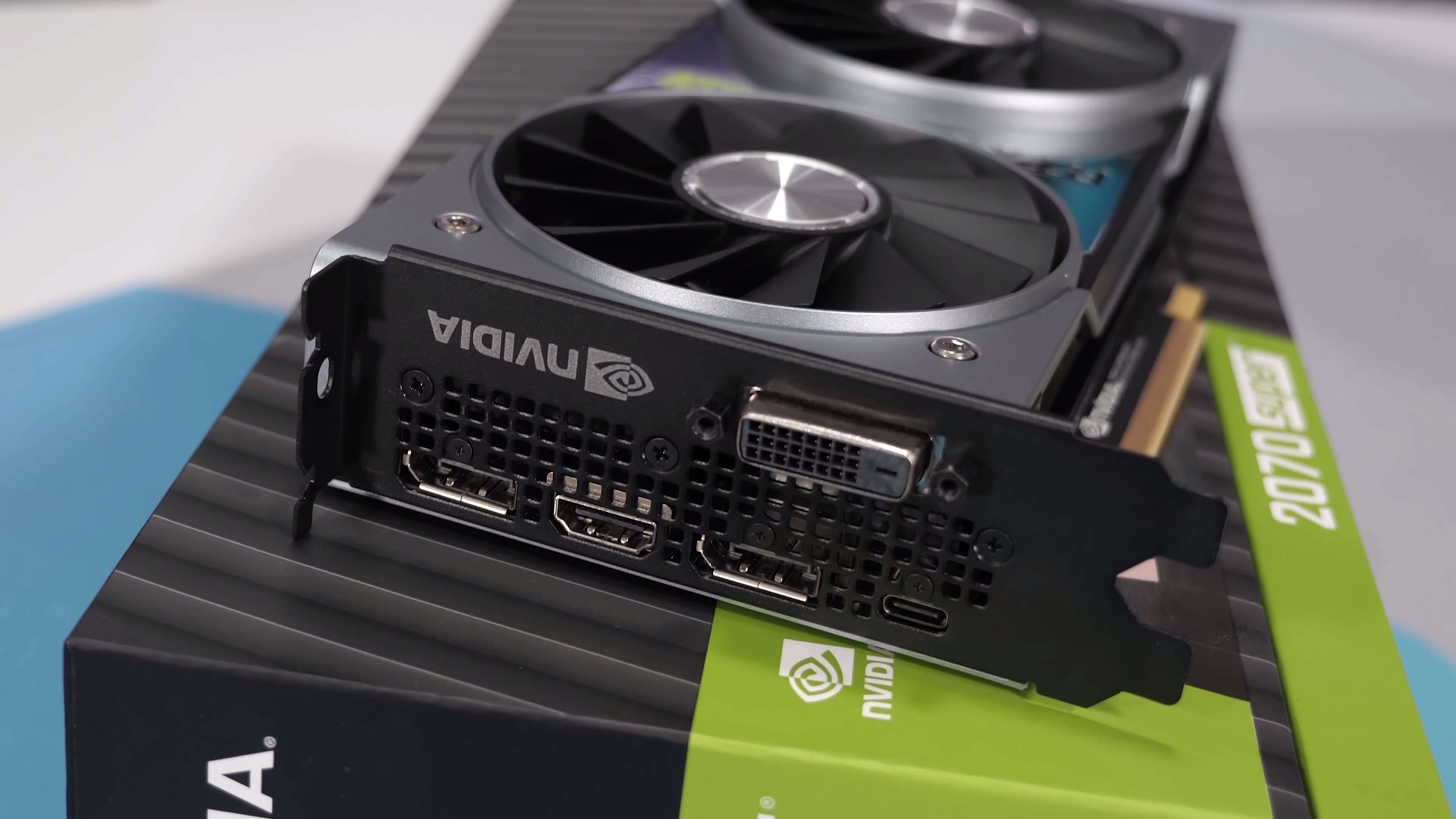
Actually Forza Horizon 4 is a good example. Recently the RTX 2070 Super saw a 30% performance boost while the 1080 Ti got a zero percent boost. This means that upon release the 2070 Super was 13% slower than the 1080 Ti in this title, today it's 10% faster. But is this an example of Nvidia adondaning optimizations for Pascal, or is it simply an example of the Turing architecture being better utilized? We'd lean towards the latter, perhaps they're now taking better advantage of Turing's concurrent FP32 and INT32 execution.
Whatever the case, as the only example we have here, it's impossible to draw a real conclusion from it. What we can tell you is that upon release, the RTX 2070 (non super) was 17% slower than the 1080 Ti. We also know that on average the RTX 2070 is 12% slower than the 2070 Super, so the fact that the 1080 Ti is still 3% faster on average seems about right.
Now, should you buy the 1080 Ti? Only if the price is right. Looking at completed listings on eBay we see that GTX 1080 Ti's are currently selling for about $500 with the most affordable example priced at around $450. Honestly we were expecting them to be much cheaper.
You can buy a brand new RTX 2070 Super for $510. Saving ~$60 for a second hand card that probably has been abused a bit, a 1080 Ti doesn't seem like a smart investment. Moreover, you can snag brand new 5700 XT's for around $425 right now, so given the 1080 Ti was on average only 9% faster, paying a little more for a second hand model doesn't seem worth it. Based on today's results, we wouldn't pay more than $400 for a used GTX 1080 Ti, in fact they'd only start to tempt us around the $350 mark.
